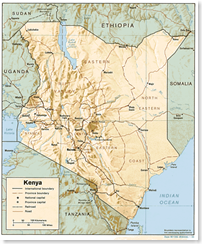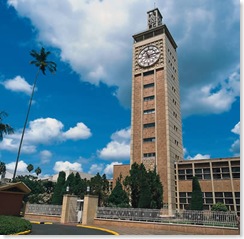
Several papers are optimistic that the deal signed between President Mwai Kibaki and Orange Democratic Movement (ODM) leader Raila Odinga will save the country from "anarchy" and "self-destruction" and heal the wounds of the conflict sparked by the disputed elections.
One commentator greets the development with the simple wish: "Let the party begin!"
EDITORIAL IN KENYA'S STANDARD
The agreement... marks the beginning of a hopeful but challenging period for Kenya. Coming at a time armed militia were reported to be preparing for renewed violence should the talks collapse, it will be remembered as the moment the nation stepped back from the brink of a precipice.
 EDITORIAL IN KENYA'S NATION
EDITORIAL IN KENYA'S NATION
The agreement... reinforces the adage that behind every cloud, there is a silver lining. Just a few days ago, it was all gloom and foreboding with indications that the talks aimed at pulling Kenya back from anarchy were on the verge of collapse... Signing that deal, along with the concessions each [has made], stands as a true mark of leadership and patriotism... Kenyans who have witnessed death and destruction on a scale they could not have imagined demand speedy implementation of the agreement.
EDITORIAL IN KENYA'S TIMES
The political settlement... helps to heal the wounds that were physically and mentally inflicted on the people following the disputed results of last year's general election... Leaders must therefore never let down the people again.
 CHRIS ODWESSO IN KENYA'S TIMES
CHRIS ODWESSO IN KENYA'S TIMES
Kenya yesterday embarked on a journey away from self-destruction to a world that once again promises hope, common sense, patriotism, reconciliation, restoration and dignity.
LUCY ORIANG IN KENYA'S NATION
The shuttle diplomacy between Mr Kofi Annan and the principals of the Party of National Unity and the Orange Democratic Movement has paid off. There's only one thing to say at this point: Let the party begin!
Deal offers fresh hope to Kenya
By Noel Mwakugu
BBC News, Nairobi


The handshake finally came after a month of talks
Many Kenyans had feared the imminent outbreak of renewed violence when peace talks were suspended on Monday but instead there is now fresh hope after the two rival leaders agreed to share power.
Both President Mwai Kibaki and opposition leader Raila Odinga gave ground under massive international pressure and the intervention of African Union Chairman and Tanzanian President Jakaya Kikwete.
They unveiled a deal that is intended to steer the country towards much-needed reconciliation after allegations of rigging in last December's elections.
However, as chief mediator Kofi Annan said: "The journey is far from over. In fact it is only beginning."
A peaceful destination will only be reached only if Mr Kibaki and Mr Odinga show the political will.
After such a bitter dispute, which has cost 1,500 lives, trust between the two men has been in short supply - this is why it took more than a month of tortuous talks for them to reach a deal.
Hurdles ahead
This will not be the first time that the two leaders have formed a joint government - they did it in 2002 but it lasted barely three years before they fell out.
While Mr Odinga looks set to take up the new post of prime minister, it is not clear who prevails in the event of a disagreement between him and President Kibaki.

POWER-SHARING DEAL
New two-party coalition government to be set up
Cabinet posts to be divided equally between the two parties
Raila Odinga to take new post of prime minister, can only be dismissed by National Assembly
 Two new deputy PMs to be appointed, one from each member of coalition
Two new deputy PMs to be appointed, one from each member of coalition

Agreement: More detail
Reaction in quotes
If the deal is strong enough to overcome that hurdle, the new optimism will prove well-founded.
All eyes in a country that has been mourning for the past two months now turn to parliament, where MPs convene next Thursday to vote for the National Accord and Reconciliation Act that will usher in these changes.
The first challenge facing the two leaders once the act is operational is to appoint a new cabinet, whose members will be shared out equally.
The violence has left deep ethnic divisions and a new cabinet must be named with a regional balance to appease communities that felt left out in the last administration.
Corruption scandals
Apart from the regional balance, Kenyans are eager to see the parties merge their policies and deliver an equal share of national resources.

Kofi Annan hailed the deal but said there was more work to be done
Economic disparities lie behind much of the ethnic tension which exploded into violence after the disputed election.
One major policy difference is that of decentralising power and therefore wealth.
This was a key campaign pledge of Mr Odinga's Orange Democratic Movement (ODM) but not Mr Kibaki's Party of National Unity (PNU).
The coalition partners now have to marry these and other areas of disagreement.
President Kibaki is credited with steering economic growth in his first term in office but corruption thrived within his administration, drawing much criticism from foreign diplomats.
This is yet another hurdle for the new coalition - both sides include people linked with corruption scandals in the past.
Many doubt if the leaders will have the courage to sacrifice them and inject fresh blood into the administration since it is clear some of those tainted by scandal helped fund the campaigns and remain very influential.
Political will?
The talks which gave birth to this new power-sharing arrangement have brought to the fore the influence of hardliners on both sides.

Odinga supporters took to the streets as the deal was announced
While Mr Kibaki and Mr Odinga may have shaken hands and exchanged pleasantries, observers are sceptical as to whether they will ignore the advice of some of their hardline backers.
But failure to contain their influence may endanger the new coalition.
The power-sharing agreement ends if either partner walks out and this would throw the country back into another phase of uncertainty.
Some argue that the new deal could produce a new breed of leader who would be respected for their political principles and not the wealth they possess, as at present.
But as Tanzanian President Jakaya Kikwete squarely put at the signing ceremony, it is the political will of the two leaders that remains central if this promise is to become a reality.
Holding fire on Kenya celebrations

For the woman whose husband was burnt alive in a church in the worst of Kenya's post-election violence, it is a little premature to celebrate Thursday's peace deal signed by the country's warring leaders.
 These land skirmishes are not about power or politics; it's not ODM and PNU - it's tribal
These land skirmishes are not about power or politics; it's not ODM and PNU - it's tribal 
Displaced farmer
"It's become a habit of saying 'peace, peace, peace' - and then after peace we see flames of fire," the mother of four says in a displacement camp on the outskirts of Eldoret in the Rift Valley Province.
"After peace we see spears; we see arrows; we see bows; we see pangas [machetes]."
The church where her husband died was set ablaze by armed youths in the first few days after President Mwai Kibaki was hastily sworn in as president on 30 December after disputed elections.
Those sheltering inside were from Mr Kibaki's Kikuyu community.
Now some 20,000 Kikuyus, Kisis and Luyhas targeted in the area have taken refugee at the showground where white tents stretch out as far as the eye can see.
'Still suffering'
A man who fled his farm agrees that violence has opened up wounds that the power-sharing agreement in Nairobi will not immediately heal.

Some 600,000 people were displaced by the violence
A coalition is to be set up headed by President Kibaki of the Party of National Unity (PNU) with Raila Odinga - whose Orange Democratic Movement (ODM) is the largest in parliament - set to take the newly created post of prime minister.
"The relationship won't help us," the farmer says.
"We'll still suffer more and more. Not unless people who fought with us talk to us and we come together with them and we forgive each other.
"You see these land skirmishes are not about power or politics; it's not ODM and PNU - it's tribal."

 I don't imagine that I'm going to stay with a person who burned my house - it can't happen because he's still my enemy
I don't imagine that I'm going to stay with a person who burned my house - it can't happen because he's still my enemy 
Unemployed youth
In Eldoret town itself, where Kalenjins make up the majority of residents, the deal was greeted enthusiastically.
Many feel they will be able to put the clashes that rocked the town behind them.
But an unemployed youth at the show ground camp sees little hope of this.
"Kibaki and Raila have decided. For me I don't see that it is a deal.
"I don't imagine that I'm going to stay with a person who stole my cloth, who burned my house - it can't happen because he's still my enemy," he says, adding that he will not be returning to his home.
Retribution
A recent school leaver wants assurances on the ground about the agreement.

 I don't feel it's OK for me to be a refugee in my own country
I don't feel it's OK for me to be a refugee in my own country 
Kikuyu widow
"For me to accept it, we need stern measures to be taken against the perpetrators so that these things will not recur in our country," he says.
"A lot of agony has taken place in our hearts.
"Families are dead and it is very late for us to say it's a power-sharing deal."
The church widow says she will not be returning to her farm any time soon and will see what happens with the coalition.
"I want to really to see [it work] as a Kenyan. I'll just take a step of faith and just watch them.
"I don't feel it's OK for me to be a refugee in my own country."
Holding fire on celebrations
Kenya press hails deal
Deal offers fresh hope to Kenya
Under the accord, which has been welcomed by Kenyans after post-electoral bloodshed, Odinga is set to become the east African country's prime minister, once parliament passes the power-sharing deal into law.
In Geneva, United Nations chief Ban Ki-moon pressed the Kenyan leaders to implement the accord, mediated by his predecessor Kofi Annan.
A separate panel is preparing a bill on the creation of the post of prime minister in a nation that has usually had a powerful presidency to be presented to parliament when it reconvenes on Thursday.
 The press in Kenya has warmly welcomed the power-sharing deal announced on Thursday.
The press in Kenya has warmly welcomed the power-sharing deal announced on Thursday.
 EDITORIAL IN KENYA'S NATION
EDITORIAL IN KENYA'S NATION





